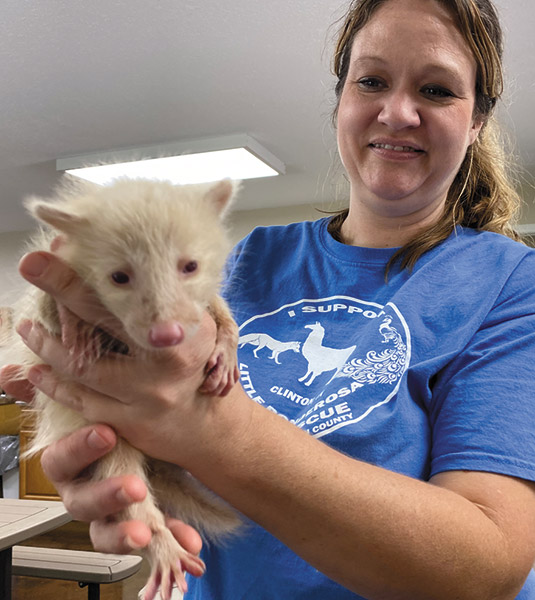A truly rare resident
Baby albino raccoon graces Little Ponderosa

On Saturday, Aug. 1, Mary Lou Redmond, manager of the Little Ponderosa Zoo and Rescue, holds the 5 week old baby albino raccoon the zoo is raising since taking him in as a rescue on July 28.
While the Little Ponderosa has long been the area’s top raccoon rehabber, this is the first albino raccoon the zoo has seen, said Mary Lou Redmond, the zoo’s manager.
“He was brought in last Tuesday [July 28], and we’re taking care of him in a special nursery,” Redmond said. “Having the albino gene, he has poor vision and hearing, so he needs special care.”
And unlike the usual raccoons the zoo rescues – about 150 each year – this new baby won’t be released into the wild when he gets older, Redmond said.
“He would never make it in the wild with his vision and hearing problems, so from now on he will live here with us,” she said.
“This will be his forever home.”
The white baby has no regular raccoon coloring, such as the signature black bandit mask, but he still has the little raccoon hands, which were desperately holding onto a baby bottle full of kitten formula while he was being fed on Saturday afternoon.
And, oh, that precious, little pink nose.
After he finished eating, he was placed on the shoulder of the person feeding him so he could be “burped” like a baby. Then after he did his little burp, he snuggled up on the caregiver’s shoulder, burrowed his face into her hair, and promptly went to sleep.
Then he began purring like a kitten.
“Yes, little raccoons do purr,” Redmond said. Who knew?
She said the albino baby, who has not yet been named, was brought to the Little Ponderosa by some local people who bought him from someone in Virginia as a pet.
“But when they got him back to Tennessee, they found out they did not have the proper permit to have him as a pet, and they were told that the Tennessee Wildlife Resources Agency would confiscate him and euthanize him,” Redmond said. “That’s when they decided to bring him to us.”
Little Ponderosa does have a rehabber’s permit from the TWRA, so the baby raccoon is safe in the zoo’s care.
“We will make sure he gets everything he needs, and he will be looked after very well,” Redmond said.
The zoo takes in rescue animals about every day, she said, with some days busier than others.
“Just yesterday, we took in a baby bird, some baby chicks, two guinea pigs, an injured hawk, two pygmy goats, a fawn with a broken leg, a rabbit, a skunk and another fawn,” Redmond said, “It’s like that just about every day.”
The albino raccoon baby is now being fed the kitten formula several times a day, along with “baby raccoon mush,” Redmond said.
“As they get older, we usually modify our raccoons’ diets to represent things they would be expected to find in the wild, so they can eventually be let go,” she said. “We won’t be doing that with this baby.”
Most of the wild animals native to this area that are rehabbed at the Little Ponderosa – including white-tail deer and raccoons --are set free in one of five nearby wildlife management areas that are overseen by the TWRA.
The albino raccoon, however, will eventually become one of the animals that visitors to the Little Ponderosa can see when they tour the facility.
But that won’t happen for a while yet – he has to grow up a bit first.

